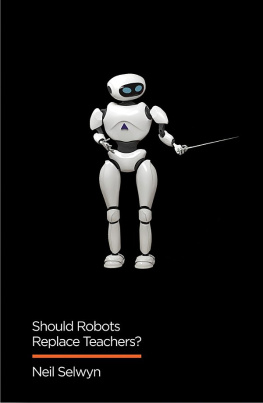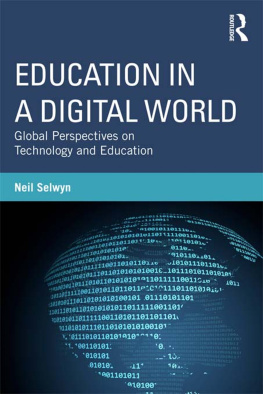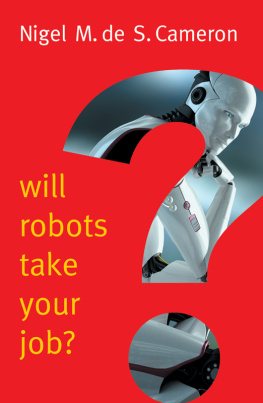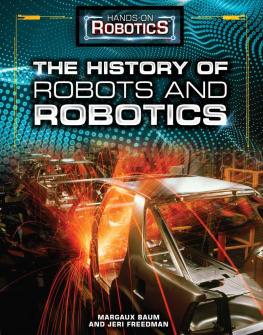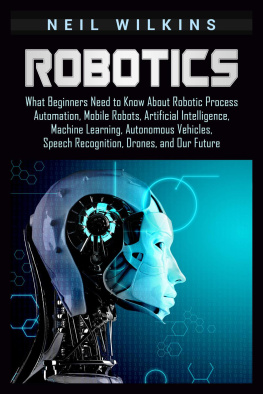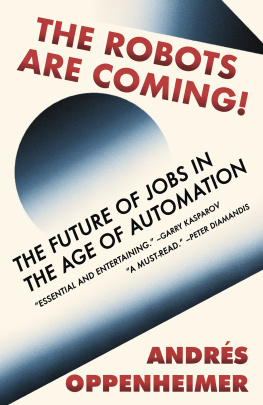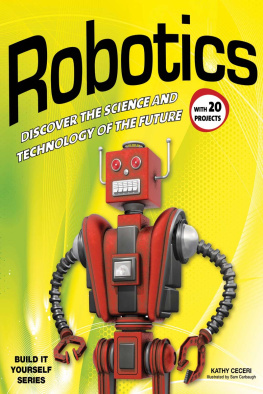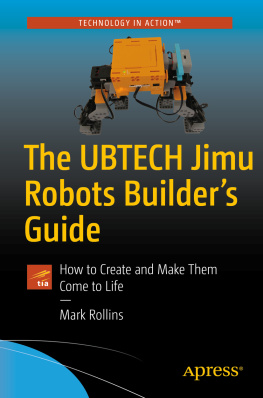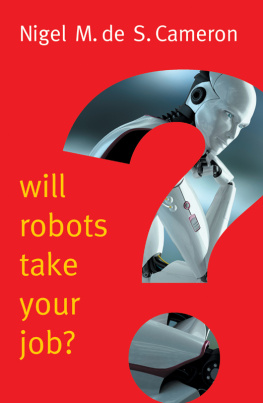Neil Selwyn - Should Robots Replace Teachers? AI and the Future of Education
Here you can read online Neil Selwyn - Should Robots Replace Teachers? AI and the Future of Education full text of the book (entire story) in english for free. Download pdf and epub, get meaning, cover and reviews about this ebook. year: 2019, genre: Children. Description of the work, (preface) as well as reviews are available. Best literature library LitArk.com created for fans of good reading and offers a wide selection of genres:
Romance novel
Science fiction
Adventure
Detective
Science
History
Home and family
Prose
Art
Politics
Computer
Non-fiction
Religion
Business
Children
Humor
Choose a favorite category and find really read worthwhile books. Enjoy immersion in the world of imagination, feel the emotions of the characters or learn something new for yourself, make an fascinating discovery.
- Book:Should Robots Replace Teachers? AI and the Future of Education
- Author:
- Genre:
- Year:2019
- Rating:4 / 5
- Favourites:Add to favourites
- Your mark:
- 80
- 1
- 2
- 3
- 4
- 5
Should Robots Replace Teachers? AI and the Future of Education: summary, description and annotation
We offer to read an annotation, description, summary or preface (depends on what the author of the book "Should Robots Replace Teachers? AI and the Future of Education" wrote himself). If you haven't found the necessary information about the book — write in the comments, we will try to find it.
Neil Selwyn: author's other books
Who wrote Should Robots Replace Teachers? AI and the Future of Education? Find out the surname, the name of the author of the book and a list of all author's works by series.
Should Robots Replace Teachers? AI and the Future of Education — read online for free the complete book (whole text) full work
Below is the text of the book, divided by pages. System saving the place of the last page read, allows you to conveniently read the book "Should Robots Replace Teachers? AI and the Future of Education" online for free, without having to search again every time where you left off. Put a bookmark, and you can go to the page where you finished reading at any time.
Font size:
Interval:
Bookmark:
Milton Mueller, Will the Internet Fragment?
Neil Selwyn, Is Technology Good for Education?
Neil Selwyn, Should Robots Replace Teachers?
Axel Bruns, Are Filter Bubbles Real?
NEIL SELWYN
polity
Copyright Neil Selwyn 2019
The right of Neil Selwyn to be identified as Author of this Work has been asserted in accordance with the UK Copyright, Designs and Patents Act 1988.
First published in 2019 by Polity Press
Polity Press
65 Bridge Street
Cambridge CB2 1UR, UK
Polity Press
101 Station Landing
Suite 300
Medford, MA 02155, USA
All rights reserved. Except for the quotation of short passages for the purpose of criticism and review, no part of this publication may be reproduced, stored in a retrieval system or transmitted, in any form or by any means, electronic, mechanical, photocopying, recording or otherwise, without the prior permission of the publisher.
ISBN-13: 978-1-5095-2898-1
A catalogue record for this book is available from the British Library.
Library of Congress Cataloging-in-Publication Data
Names: Selwyn, Neil, author.
Title: Should robots replace teachers? : AI and the future of education / Neil Selwyn.
Description: Cambridge, UK : Medford, MA, USA : Polity Press, [2019] | Series: Digital futures | Includes bibliographical references and index.
Identifiers: LCCN 2019001774 (print) | LCCN 2019011944 (ebook) | ISBN 9781509528981 (Epub) | ISBN 9781509528950 | ISBN 9781509528967 (pb)
Subjects: LCSH: Artificial intelligence--Educational applications. | Intelligent tutoring systems.
Classification: LCC LB1028.43 (ebook) | LCC LB1028.43 .S45 2019 (print) | DDC 371.33--dc23
LC record available at https://lccn.loc.gov/2019001774
The publisher has used its best endeavours to ensure that the URLs for external websites referred to in this book are correct and active at the time of going to press. However, the publisher has no responsibility for the websites and can make no guarantee that a site will remain live or that the content is or will remain appropriate.
Every effort has been made to trace all copyright holders, but if any have been overlooked the publisher will be pleased to include any necessary credits in any subsequent reprint or edition.
For further information on Polity, visit our website: politybooks.com
The digital automation of teaching is set to be one of the defining educational challenges of the next twenty years. While the deployment of human-looking robots in classrooms remains more of a publicity stunt than a serious educational trend, many other forms of digital automation are being implemented across schools and universities around the world. Teachers are not being replaced by physical robots per se, but are increasingly surrounded by software, apps, platforms and other forms of artificial intelligence designed to carry out pedagogical tasks.
Most teachers remain confident that they are unlikely to be pushed aside by intelligent systems any time soon. Nevertheless, teachers at all levels of education already face the prospect of working alongside these technologies. Thus, it is certainly worth exploring the extent to which human teachers might be displaced by machines in the near future. What aspects of teaching might it soon no longer make sense for humans to perform? Can automated systems free teachers up to work in different and more rewarding ways? Alternatively, will the humans who remain employed in education settings be compelled to work in an increasingly machine-like manner?
These are no longer frivolous or far-fetched questions. Powerful technologies are now being designed to autonomously support various types of learning from infants picking up their first words through to physicians honing their surgical skills. A billion-dollar EdTech market continues to grow as investors, developers and self-styled edu-preneurs strive to overturn traditional modes of education, while also making tidy profits. The matter of how people learn (and, it follows, how people are supported in their learning) continues to be an area that is widely considered ready for innovation, reform and disruption. The long-held professional status of school teachers and university lecturers is definitely under threat.
Amidst this hyperbole, it is important to remain level-headed and think carefully about the likely implications and broader consequences of such developments. There is little point in writing a book that simply celebrates the different forms of automated teaching that now exist. Instead these are technologies that need to be challenged and problematized. Yet critiquing the impending automation of education is no easy task, not least because discussions of the future are inherently speculative in nature. In many ways, then, this book is concerned ultimately with what we want from education in the near future the values that we feel should be associated with children and young peoples learning, the purposes that we want to ascribe to higher education, and the priorities that lie behind vocational training. These are definitely not straightforward technical issues. As such, our discussions need to engage with the politics of digital automation as much as with matters of design and efficiency.
These bigger-picture concerns are reflected in the choice of book title. The book might have been titled Can Robots Replace Teachers? However, it does not take long to see that the answer to this particular question is a resounding Yes. As the next five chapters will detail, there are already plenty of devices, systems and applications that are capable of dealing with various aspects of teaching work. Another quickly answered alternative title would be Will Robots Replace Teachers? Again, in short, the answer to this question is Probably if we let them. There is already a growing appetite for specific forms of teaching work no longer being carried out by humans for example, taking attendance registers and grading assignments. Instead, the most pertinent question to ask is Should Robots ReplaceTeachers? Given that we are now starting to see the mainstream use of these powerful technologies, what do we want to happen?
Titling this book toward should rather than could moves the discussion into the realm of values, judgements and politics reminding us that the integration of any technology into society should always be approached as a choice. The fact that automated teaching technologies are now being designed and developed does not mean that they will inevitably be used in consistent ways with predetermined outcomes. History shows that technological change is non-linear, contingent and influenced by the different social contexts in which it is implemented. The ways in which technology unfolds across societies are never fully predictable or knowable. This uncertainty is what makes the prospect of any new digital technology exciting (but also dangerous). As such, it is crucial that we consider the possibility of alternative technological pathways and different digital futures for education.
As with all discussions about technology and society, these are difficult questions with no easy answers. This is a book that explores the big issues behind what can often appear to be unfathomably sophisticated tools and techniques. Rather than telling readers exactly what to think, the main aim of this book is to expand the nature of conversations about the future of teaching in the digital age. As the chapters progress, various arguments emerge for slowing down and fighting back against the excessive automation of education. Yet these arguments simply reflect my personal take on the topic ultimately no one can be completely certain of how things will unfold. So, it is important to not take everything that is argued in this book as an inevitable fact or irrefutable truth. However nuanced and informed they might be, all discussions about the future of technology involve large doses of speculative thinking and guesswork. We cannot be sure of exactly what
Font size:
Interval:
Bookmark:
Similar books «Should Robots Replace Teachers? AI and the Future of Education»
Look at similar books to Should Robots Replace Teachers? AI and the Future of Education. We have selected literature similar in name and meaning in the hope of providing readers with more options to find new, interesting, not yet read works.
Discussion, reviews of the book Should Robots Replace Teachers? AI and the Future of Education and just readers' own opinions. Leave your comments, write what you think about the work, its meaning or the main characters. Specify what exactly you liked and what you didn't like, and why you think so.

